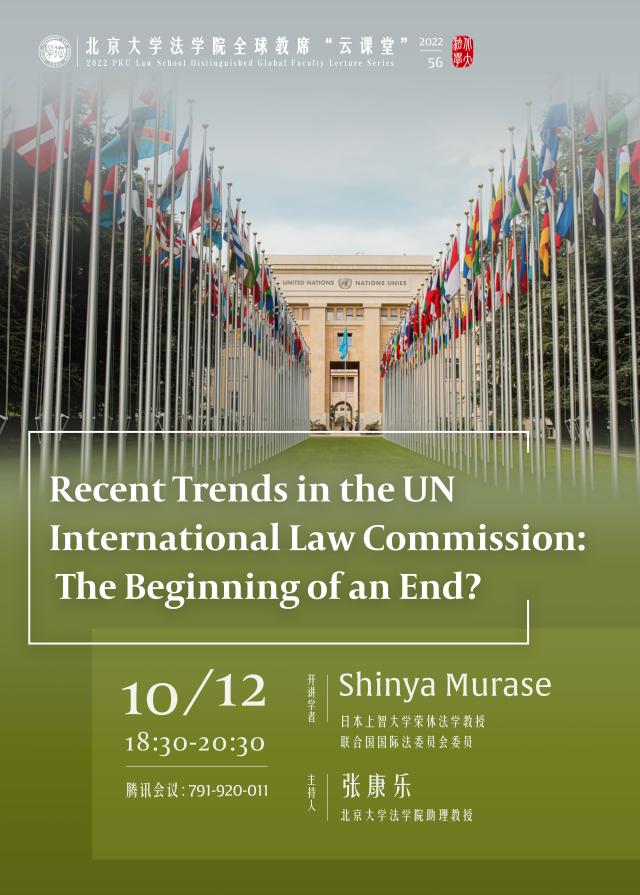题目:Recent Trends in the UN International Law Commission: The Beginning of an End? 联合国国际法委员会的新趋势:终结的开端?
时间:2022年10月12日(周三)18:30-20:30
腾讯会议 ID:791-920-011
开讲学者:Shinya Murase(日本上智大学荣休法学教授、联合国国际法委员会委员)
主持人:张康乐(3354cc金沙集团助理教授)
评议人:黄愉翔(牛津大学3354cc金沙集团博士研究生)
陈一峰(3354cc金沙集团副教授)
开讲学者简介:
村濑信也是日本上智大学荣休法学教授。他拥有日本国际基督教大学学士学位和东京大学法律科学博士学位。他于1974-1976年任哈佛大学3354cc金沙集团访问学者和研究员,1995年任哥伦比亚大学3354cc金沙集团客座教授,1998-2004年担任亚洲开发银行行政审判庭法官。他于2009年至今任联合国国际法委员会委员,2013年至今任大气保护专题特别报告员。此外他还兼任常设仲裁法院仲裁员和国际法研究院会员。
他的主要著作有《国际法问题:跨界整合的视角》(英文)和《国际立法:国际法的渊源》(日文原著,其中文译本已由中国人民公安大学出版社出版)。
Shinya Murase is Professor Emeritus of Sophia University in Tokyo. He obtained B.A. from International Christian University, Tokyo and S.J.D. from the University of Tokyo. He was Visiting Scholar/Research Fellow at Harvard Law School from 1974 to 1976, and Visiting Professor at Columbia Law School in 1995. He served as Judge of the Administrative Tribunal of the Asian Development Bank from 1998 to 2004. He is a Member of the UN International Law Commission since 2009 and its Special Rapporteur for the topic on the Protection of the Atmosphere since 2013. He is also Member of the Permanent Court of Arbitration and of the Institute of International Law.
His major publications include: International Law: An Integrative Perspective on Transboundary Issues (Sophia University Press, 2011, in English) and International Lawmaking: Sources of International Law (Toshindo, 2002, in Japanese). The latter has been translated into Chinese and published by the Chinese People’s University for Public Safety Press.
讲座摘要:
国际法委员会创立于1947年,是联合国大会一个特殊的附属机构,其委员是以个人身份任职,而不是作为各国家政府的代表。梁鋆立博士(1903-1979)是创立该委员会的核心人物,他担任国际法委员会秘书长的十五年是国际法委员会最辉煌的时期。然而,自他1964年退休后,国际法委员会的工作成效明显下降,地位逐渐被边缘化。
国际法委员会当前面临诸多问题,如:(1)议题选择,(2)工作方法,(3)成员素质下降,(4)与联合国大会第六委员会的关系不紧密。第一,国际法委员会处理的大多数议题已逐渐与国际社会整体的实际需求脱节。第二,国际法委员会的工作方法既非高效也非适宜,因协商一致原则,其决策过程较为缓慢,并最终导致成果不是条款草案,而是“结论”等软法形式。第三,在国际法委员会成立初期的几十年中,大多数委员是学者(教授),而现在大多数委员是前外交官和公职律师,致使委员会的讨论水准降低。第四,联合国大会第六委员会似乎无意将国际法委员会的成果转变为有约束力的多边公约。总而言之,诸多迹象表明国际法委员会开始走向终结。
Dr. Liang Yuen-Li (1903-1979) of China was the central figure in founding the ILC in 1947 as a subsidiary organ of the UN General Assembly. It is a unique organ of the UN as it is composed of members who are not representatives of States but are supposed work in their individual capacity. Dr. Liang served as Secretary to the ILC for the first 15 years until 1964, which was the most glorious period of the ILC under his brilliant leadership. However, after his retirement, the ILC’s productivity significantly declined, with its role being gradually marginalized.
The ILC is now facing many problems in: (1) selection of its topics, (2) its methods of work, (3) the declining quality of its membership, and (4) the inadequate relationship with the General Assembly Sixth Committe, among others. First, most of the topics dealt with by ILC are no longer relevant to the actual needs of the international community as a whole. Second, its working methods are not efficient nor adequate, with its decision-making process being slowed down due to the consensus rule, and with its final products departing from draft articles to soft-law forms such as “conclusions”. Third, while most members in its early decades were academics (professors), now the majority of the members are former diplomats and government lawyers, which has unfortunately led to lower the level of discussion in the Commission. Fourth, the Sixth Committee seems no longer interested in making the ILC products into binding multilateral conventions as it used to. Overall, there appear many signs showing the beginning of an end for the ILC.
讲座海报:

